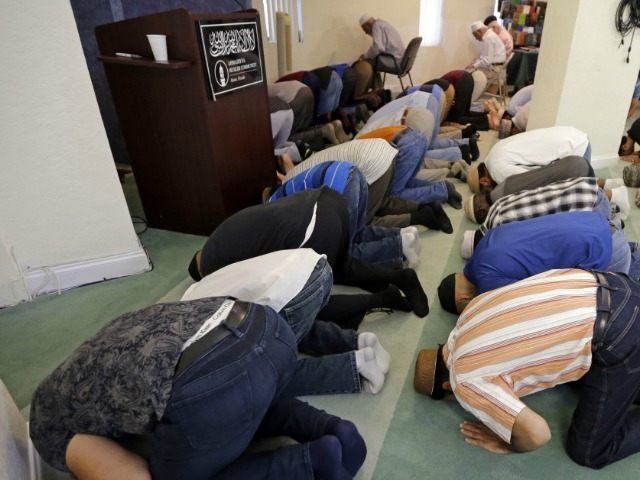A strong majority of South Carolina’s GOP voters want to stop the migration of more Islamic believers into the United States, even as the majority also wants to protect the religious rights of Islamic believers who are already living in the United States, according to a new poll by the Democratic-affiliated firm, Public Policy Polling.
The poll shows Americans’ sophisticated ability to simultaneously reject disliked foreign doctrines and also respect the right of Americans — both native-born or immigrant — to freely embrace those disliked doctrines.
When the poll asked “Would you support or oppose banning Muslims from entering the United States?” 60 percent of the state’s GOP voters said they would support a ban.
But only 29 percent of respondents said they would “support … shutting down mosques” in the United States, and only 25 percent said the disliked Islamic doctrines should be illegal.
This nuanced and balanced response is anathema to many progressives, some of whom argue that Americans must grant the same rights and respect to foreigners that are held by Americans. For example, President Barack Obama says Americans have no right to restrict the immigration of other peoples, even if Americans conclude the immigrants’ beliefs are poverty-inducing, unpleasant, dangerous and contrary to Americans’ preferred culture.
Once the Feb. 14 to Feb. 15 PPP poll was released, foreign-born Islamic advocates complained about Americans’ dislike of Islam. “Polls show @realDonaldTrump’s #GOP backers are most anti EVERY minority group & don’t respect constitutional rights of others,” complained Mohamed Elibiary. He’s a Texas-based Muslim who has frequently declared his support of the Egyptian-based Muslim Brotherhood group, which wants to forcibly impose orthodox Islamic theocracies on many populations.
This simplistic hostility to Americans’ sophisticated, democratic, pro-freedom political culture was echoed by the crude either-or questions in PPP’s simplistic poll.
For example, the poll asked Americans if they would support or oppose shutting down mosques, but did not suggest any circumstances that would guide response.
In France, for example, recent circumstances have prompted the left-of-center government has begun shutting down mosques that preach jihad. That France-first policy was adopted once migrating jihadis murdered more than 100 people in Paris in November.
In the United States, since the atrocity on 9/11 2001, at least 100 believers in Islam — most of whom were invited into the country by the federal government’s immigration policy — have been arrested on terrorism charges. In May 2015, for example, two devout Muslims tried to shoot the many attendees at an art exhibition in Garland, Texas. The two Muslims were quickly shot dead by a policeman who had been hired by the event’s organizers, who correctly profiled observant Muslims as likely to attack their exhibition of cartoons of Islam’s reputed founder.
Despite the many attacks by orthodox Muslims, 47 percent of the South Carolina GOP respondents said they oppose shutting down mosques, 36 percent opposed a database of Muslims in the United States, and 53 percent said Islam should be legal in the United States.
Trump’s supporters showed the strongest opposition to Islamic beliefs. Eighty percent would support a ban in additional Islamic immigration, and 40 percent would shut down mosques in some circumstances.
In comparison, the ban on Islamic migration was supported by only 29 percent of Jeb Bush’s supporters, and by only 31 percent of Gov. John Kasich’s supporters.
Still, 20 percent of Bush’s supporters and 15 percent of Kasich’s supporters would favor shutting down mosques under some circumstances.
The PPP poll also asked respondents “Would you support or oppose creating a national database of Muslims in the United States?” That question is also crude, in part, because the federal government already has many databases of Americans, including those with criminal histories.
The poll showed that 47 percent of South Carolina GOP supporters would support a database, while 36 percent would oppose the database, despite the many jihad attacks that have taken place in the United States.
Sixty-two percent of Trump’s supporters would support a database, while 23 percent would oppose the database. Only 34 percent of Bush’s supporters, and 21 percent of Kasich’s supporters, would back the database.
Amusingly, South Carolina’s GOP voters showed more support for the immigration of gays and lesbians than of Muslims. Twenty percent said they would prefer to stop gay and lesbian immigration, while 63 percent would oppose restrictions.
A 2013 poll by Pew showed that homosexuality is almost universally unacceptable in nearly all Muslim-majority cultures. It is also strongly stigmatized by many U.S-based Muslims, including a U.K.-born Muslim cleric who recently was part of a small group invited to meet with Obama at a Baltimore mosque. That open Muslim hostility to gays and lesbians helps to explain why so many GOP supporters in South Carolina oppose greater immigration of Muslims.

COMMENTS
Please let us know if you're having issues with commenting.